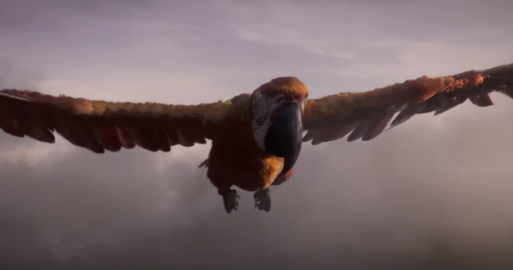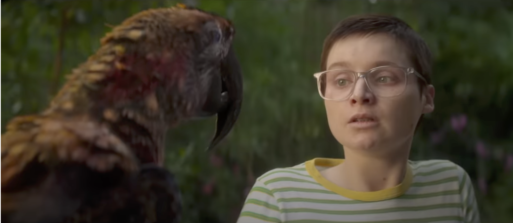
Death arrives as a size-shifting, talking macaw in “Tuesday.”
“Tuesday” may be one of the most original and strangest movies ever made about death. In fact, Death is one of the co-stars, anthropomorphized as a talking, size-shifting macaw that dispatches souls with the sweep of its wing.
The story centers around Zora (Julia Louis-Dreyfus) and her teenage daughter Tuesday (Lola Petticrew), who is dying from a terminal illness. Zora can’t cope with losing her daughter and chooses to spend her days out of the house, leaving Tuesday in the care of a visiting nurse while she pretends to go to work, hanging out in cafes or the park instead.

Death comes calling for Tuesday.
One afternoon, Death wings into the garden patio where Tuesday, parked in a wheelchair, is struggling to breathe. Tuesday seems to sense that the strange bird with a Darth Vader-esque baritone (voiced by Arinzé Kene) isn’t there to make friends, but she ends up befriending it through an act of kindness nonetheless. Bonding during a bath, a few bong hits, and their shared appreciation of “It Was a Good Day” by rapper Ice Cube (there’s a bit of levity in the movie), Death grants her a reprieve until she can see her mother that evening. But when Tuesday tells her mother that she’s dying, the admission elicits an angry denial, until Death perches on the end of Tuesday’s bed, announcing, “Madame, you need to say goodbye to your daughter.” Zora flies into a mama-grizzly rage, attacking Death and ultimately making a bizarre choice that produces an unexpected turn, which takes Zora and her daughter on a journey that allows her to see the mercy and necessity of dying.
“Tuesday” is the debut creation of Croatian filmmaker Daina Oniunas-Pusić. She gets points for sheer inventiveness with this end-of-life fairytale, but one wonders what the intent was behind the auteur’s design of this movie. Incorporating a magical animal into the tale gives it a dark, Disney-like feel, as if it were intended for children as a way to introduce them to the concept of death, were it not for the occasional F-bomb. While the story follows the well-defined steps humans encounter when confronting death — denial, anger, bargaining, depression and acceptance — it doesn’t offer any fresh insights into the experience.
The allegorical path that “Tuesday” travels is so fantastical — at times preposterous — that it’s unlikely anyone would find something in the story that’s useful for coping with an impending transition of a loved one, or handling grief afterward, unless they see themselves in the mother who can’t accept the loss of her daughter and are moved to do better. The movie seems to try so hard not to be sentimental that a story you’d expect to be a one- or two-tissue experience elicits no tears, and no sense of having witnessed something profound. Plus, shot in a predictable melancholy palette in often spare, indoor spaces, the film feels overlong and, at times, arid.
“Tuesday” is one of those films that thrills critics but leave the audience scratching their heads. On the film review site Rotten Tomatoes, 81% of the critics gave it a thumbs up but only 49% of the audience concurred. Appreciating the movie depends on one’s ability to suspend disbelief and go along on a surreal ride, wondering what you’d do if that feathered Grim Reaper perched on your bedpost.

 “Tuesday,” directed by Daina Oniunas-Pusić
“Tuesday,” directed by Daina Oniunas-Pusić


 First the Wealth Gap, Now the U.S. Has a Growing Health Gap
First the Wealth Gap, Now the U.S. Has a Growing Health Gap
 How to Comfort A Dying Loved One
How to Comfort A Dying Loved One
 Our Annual Seven Holiday Gifts for Someone Who Is Grieving, 2024 Edition
Our Annual Seven Holiday Gifts for Someone Who Is Grieving, 2024 Edition














